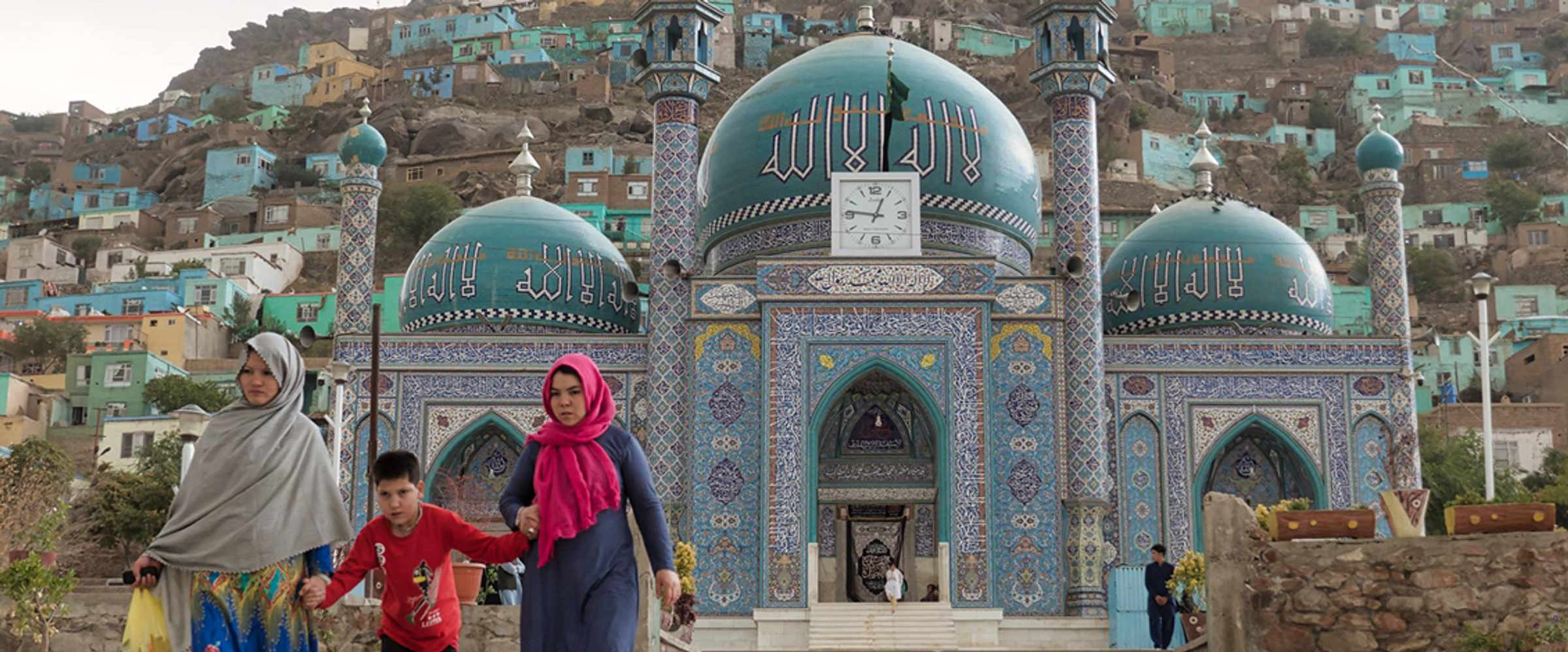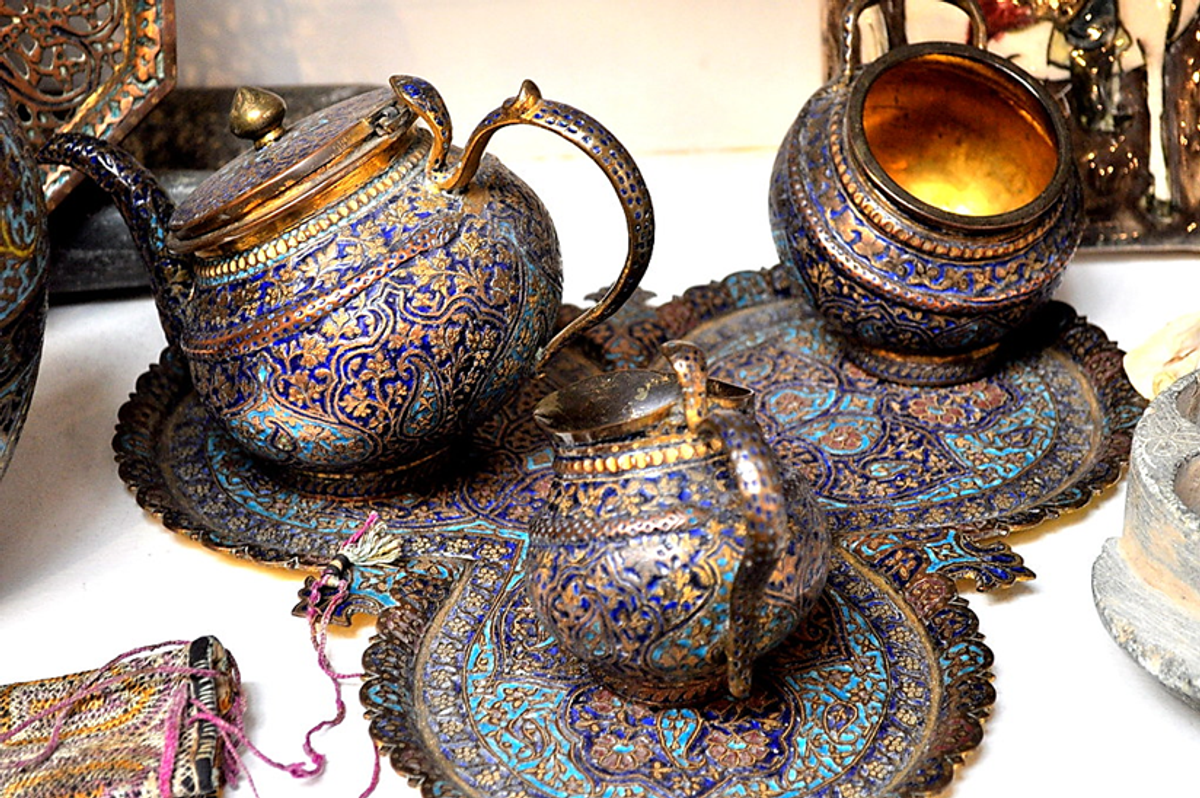Greetings
- Greetings between people of the same gender usually involve a handshake with the right hand.
- Close friends and family may hug, backslap, and kiss one another on the cheeks.
- People generally do not touch those of the opposite gender during greetings unless they are a close family member.
- Some Afghan men and women may be comfortable shaking hands with the opposite gender. However, men should wait until a woman extends her hand first before extending his own hand for a handshake.
- Men may greet women by placing their hand over their heart and nodding. This greeting may also be used to greet other people who you perceive are unaccustomed to being touched.
- People may kiss a person’s forehead or right hand to show deep respect. However, it is not acceptable for a male to kiss a female in this manner if they are not related.
- Eye contact should be kept to a minimum during greetings out of modesty, especially between men and women.
- A common verbal greeting is “Salam” or “Salam alaikum”, meaning “Peace be upon you”. People usually place their right hand over their heart when they speak, to show respect and sincerity in the greeting.
- Greetings are usually prolonged as each person enquires about the other. Afghans usually ask about how a person’s health, business or family is going. Wait for these initial pleasantries to finish before asking a direct question.
- People ask, “How are you?” by saying “Tsenga yee” in Pashto, “Chutoor hasta” in Dari or “Shoma chetur hastin” in Farsi.
- Use a person’s last name and title when greeting them unless they permit you to move on to a first-name basis. The title comes after the last name in Afghanistan (e.g., Smith Mr.), such as "Hussaini Sahib". If someone is a doctor, you would say “Dr. Hussaini Sahib”.
Communication
Verbal
- Communication: Afghans tend to speak both directly and indirectly depending on whom they are interacting with. When the person is older than them or of the opposite gender, communication tends to be quite indirect, deferential, and respectful. However, for people their own age or younger, conversation can become more direct and open. Afghans generally admire people who are articulate.
- Hierarchy: The language people use to address one another varies depending on their age difference, status, and relationship. For example, men that are of the same age bracket generally refer to each other as “brother” and act quite informally. Meanwhile, those who are clearly older than oneself are treated with utmost respect.
- Raised Voices: Raising one’s voice at someone in public is very disrespectful and likely to make everyone around feel intensely uncomfortable. In Afghanistan, raised voices can make surrounding people scared that something dangerous (e.g., an attack) is about to occur.
- Blessings: Blesses and curses are said on a daily basis in Afghanistan. These are short expressions that wish for God’s intervention depending on the situation (e.g., “May God give you health” or “May God curse your soul”). Blessings are often said instead of a ‘Thank you’.
Non-Verbal
- Hands: There is a separation between the functions of the hands in Afghan culture. This custom is tied to Islamic principles that prescribe the left hand should be used for hygiene purposes. Therefore, it is considered more unclean and should not be used for functions such as waving, eating, or offering items. Always use the right hand to gesture, touch people or offer items.
- Eye Contact: Afghans lower their gaze and avoid sustained eye contact with members of the opposite gender. Younger people may also lower their gaze from elders. This is considered respectful and observant of differences in status. However, when talking to people of the same age, gender or status, direct eye contact is expected.
- Physical Contact: It is inappropriate to be physically affectionate with any person of the opposite gender outside the house or in the company of those one does not know well. After an initial handshake (if there is one), there should be no contact between genders. It is generally acceptable for male friends to show physical affection in public – for example, it is normal to see male friends walking whilst holding each other’s hands. However, women are generally not allowed to show any kind of physical affection to anyone unless they are out of the public eye. This does not apply in necessary circumstances (e.g., a mother holding the hands of her male son when crossing the road). It is okay to touch friends and family in a friendly way (such as backslapping) when in the confines of the home.
- Personal Space: Afghans usually give people of the opposite gender a respectful amount of personal space – usually around an arm’s length. However, people often sit/stand very close to those who are of the same gender. Some Afghans may stand at proximities that you consider uncomfortable or within your personal space. It is likely they have not been made aware of the discomfort some Westerners feel with it and do not realise the awkwardness.
- Gestures: Hooking the index fingers together signifies agreement. The thumbs-up gesture is considered rude and has the same connotation as raising one’s middle finger for traditional Afghans. The “OK” sign with the hand can symbolise the evil eye or something more lewd. Stroking one’s beard or pounding a fist into one’s hand may signify revenge.
- Feet: It is considered insulting to show or expose the bottoms of your feet to other people. Do not point your feet towards other people when sitting down.
- Winking: Winking at a member of the opposite gender is considered extremely inappropriate. A man would likely be highly offended and angry if he saw his female relative being winked at.
- Nodding: Consider that nodding may not necessarily indicate that an individual understands or agrees with what you are saying. An Afghan may nod out of politeness. Follow up crucial information with questions so they can show they know and understand what you said.
Do's and Don'ts
Do’s
- Be sensitive to the experiences that Afghan refugees have endured. There is a high occurrence of anxiety, depression, and post-traumatic stress disorder among those that have witnessed the loss of their family and friends. Many Afghans that have fled to Western countries have had their entire home/village destroyed by the Taliban or other forces, and do not possess any memorabilia. Furthermore, the trauma of some may have been intensified in Australia’s detention centres.
- If the opportunity arises, offer sympathy regarding the current situation in their home country. Afghans are likely to deeply appreciate the gesture and respond with warmth. However, be sensitive not to push for details of their personal experiences in Afghanistan.
- Recognise that experiences of persecution differ between ethnicities and be aware that members of minority ethnicities may prefer to identify by their ethnic affiliation overseas (e.g., Tajik, Hazara, Uzbek, etc.). Pashtuns are much more likely to identify solely as “Afghan”, as it is historically synonymous with “Pashtun”
- Be aware that individuals who have been the target of religious persecution may prefer not to discuss faith.
- If you are a man, wait for an Afghan woman to initiate a handshake or conversation before doing so yourself. If you are a woman in Afghanistan, wait for your male accompaniment to introduce you to another man before engaging with him (be that shaking his hand, speaking to him, or making direct eye contact).
- If in a group of Afghan men and women in public, expect the males to talk to each other without the females engaging in conversation after introductions. They may only feel comfortable talking to their own gender once they are together alone.
Don’ts
- Do not call Afghans “Arabs” or “Middle Eastern”. Afghanistan is not located in the Middle East. It is a South-Central Asian country composed of many different ethnicities, none of which are Arab.
- Avoid mentioning the topics of ethnic tension, politics, the Taliban, warfare or women’s rights unless your counterpart initiates the conversation, or you have a close relationship with them. These are sensitive subjects in Afghanistan and such discussions can lead a person to recall negative experiences.
- Do not assume that all Afghan Muslims follow a conservative interpretation of Islam. The official position of many Afghans religious leaders does not reflect the interpretations of all Afghan people. For example, not all Afghan Muslim women living in other countries wear the hijab.
- Avoid asking questions that assume Afghan people are uneducated or uncivilised, such as “Do you have phones in Afghanistan?”. Many Afghan migrants living in English-speaking countries are skilled, educated, urbanised and familiar with the technologies of the developed world.
- Avoid telling dirty jokes or making fun of someone in a humiliating way. Such humour is unlikely to be appreciated.
- Avoid losing your temper or complaining about petty things that are not overly significant. Afghans are very resilient and stoic people. Struggle is constantly put into perspective considering those still experiencing extremely violent and dire conditions in Afghanistan, as well as those who have passed away. Therefore, people are expected to control their emotions, be patient and composed.
- Do not push an Afghan to tell you about their family. Some people have been separated from relatives or had family members killed. Others may be hesitant to talk about the family they have left in Afghanistan out of fear that it could endanger them.
Presentation and preparation by:
Hussam Saraf Multicultural Liaison Officer
Cultural Review by:
Aqeel Zaydi
Multicultural Liaison Officer










